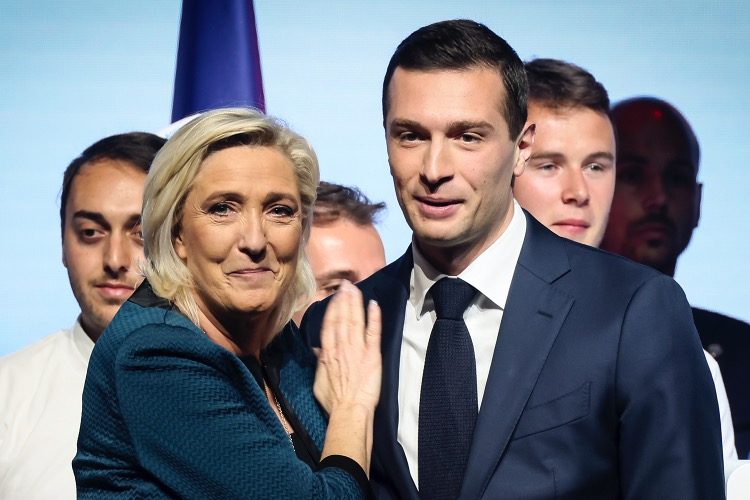
The results of France’s first round of elections are in, and they may be an omen of troubled times ahead for French President Emmanuel Macron. Rival Marine Le Pen’s National Rally (RN) party, which European election watchers describe as “far right,” took the first of the two-round election with more than 33 percent of the vote. The far-left coalition New Popular Front (NFP) came in second with approximately 28.5 percent. Macron’s own coalition, the Ensemble alliance, came in third with just over 20 percent.
Macron unexpectedly dissolved parliament on June 9 after a disastrous showing in the European elections with National Rally coming out victorious in what many saw as a backlash against draconian climate regulations and lax immigration policies.
Le Pen and NR’s victory was not yet decisive, as they will still be short of a majority in the National Assembly. The second round of elections will take place on July 7. Projections show NR winning from 230-280 seats in the 577-seat lower house.
Macron said he was seeking “clarification” from voters.
Turnout for the election was huge, especially given the mere three-week timeline for the snap vote. Nearly 67 percent of eligible French voters participated, compared to only 47.5 percent participation in 2022.
“Democracy has spoken, and the French people have placed the National Rally and its allies in first place — and has practically erased the Macronist bloc,” Le Pen told a raucous crowd in Henin Beaumont.
“Nothing has been won — and the second round will be decisive,” Le Pen cautioned.
Mainstream media have been pointing out that a victory by RN would usher in the most “right-wing” French government since the Nazi puppet Vichy government ruled during World War II.
One Macron ally, Clément Beaune, offered the coming British election in which the left-wing Labour Party is expected to do well as the path forward for the French electorate.
“The far right in power would be a tragedy, not for the President or ‘the macronie’, but for all French people, and first of all the most modest,” Beaune offered. “At a time when our British friends are about to turn the page on demagogic nationalism, let’s not dive into it. Coming out is long and painful.”
Left-wing parties could unite in the second round of elections scheduled for next weekend in hope of denying NR a clear victory. For instance, Macron ally Sylvie Casenave-Péré has withdrawn from her contest with Le Pen’s sister Marie-Caroline Le Pen and far-left candidate Élise Leboucher.
“I therefore withdraw having done my best to avoid the possible entry of another member of the Le Pen clan into the National Assembly,” read a Casenave-Péré statement posted to X.
Green Party leader Marine Tondelier made a personal plea to Macron to advise certain candidates to stand down in order to deny NR victory.
“We’re counting on you: withdraw if you come third in a three-way race, and if you don’t qualify for the second round, call your supporters to vote for a candidate who supports republican values,” Tondelier said.
Hungarian MP and political director for Viktor Orbán, Balázs Orbán, warned that change was coming in Europe and possibly worldwide.
“Biden, Macron… #change is coming. ’Spontaneously and simultaneously, the voters of the #West are rising up to repudiate their leaders.’ But not everywhere: @PM_ViktorOrban and @realDonaldTrump are two great exceptions!” Orbán posted on X. “For the first time since the Treaty of Westphalia, governments of major Western countries are falling. Why? Because ‘all of them agreed to an agenda that their voters reject because it has degraded the quality of their lives.”
Macron called the snap elections in what he claimed was a “grave and serious” move intended to block extremists “who endanger our nation.” But if the Round One results are any indication, the move appears to have backfired on him and strengthened Le Pen’s National Rally party. What will follow is a week of haggling with left-wing extremists in an effort to keep National Rally from gaining a majority in the lower house of France’s parliament, which means more back-room deals and more compromise.
Macron will continue on as president, as his term will last until 2027. But he now faces the prospect of having a prime minister from a different party. Whatever ultimately happens, the one-time French political superstar’s shine will have significantly dimmed, especially if he’s forced into “cohabitation” with Le Pen’s National Rally party.




